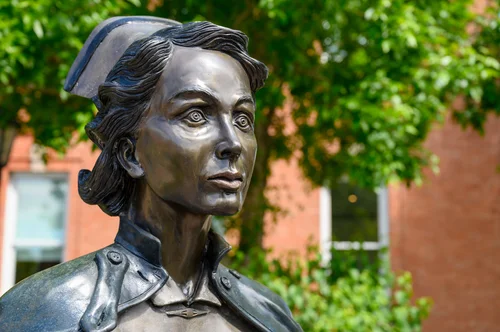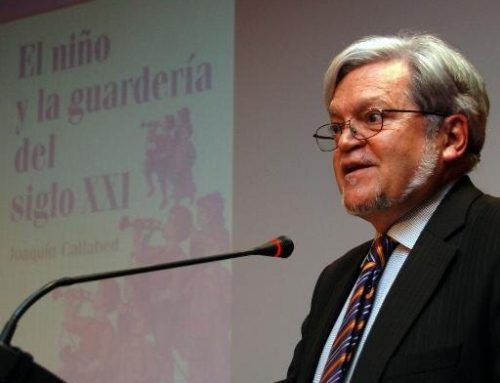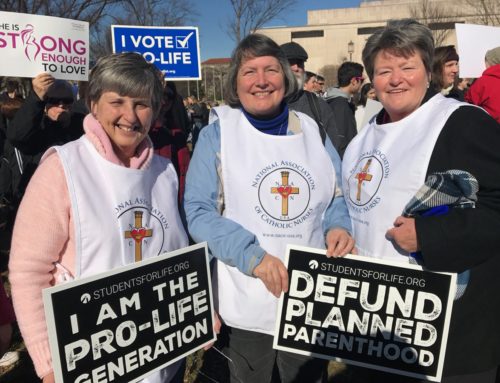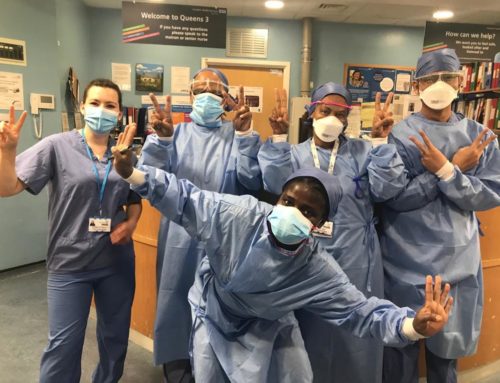NCBC Resources for COVID-19 RSS

While working night shift and completing rounds as a Catholic nurse, I am frequently overcome by faith in the silent shadows. Nighttime nursing offers a special time for quiet realization of the value, dignity, and gift of each and every human life. This profound realization occurs amidst the normalcy of a shift—hearing the sound of a new baby’s cry, or performing the rhythmic duties for a patient who needs ventilator care. It occurs in a touch, perhaps while taking a pulse; in a gentle word of support in response to a worried look; in the witness of the surrender in a patient’s last breath.
Often unspoken, the profession of nursing has the honor and the privilege to witness, assist, and support another human being during life’s most challenging moments. Nursing indeed provides an up-close view of one of the sacred mysteries of God. Then suddenly, the lyrical chirp of a monitor or an alarm calls the nurse back into action. The priority turns to medication calculation and clinical intervention. Yet these quiet moments remain ever-present, waiting to return.
The Catholic nurse knows and understands that our rich historical tradition urges us to care for the sick as one would care for the suffering Christ. As Saint Vincent de Paul said to the Daughters of Charity, “When you leave your prayers for the bedside of a patient, you are leaving God for God. Looking after the sick is prayer.”[1] Contemporary Catholic nursing understands the Christian call, or vocation, to serve the sick. Yet a monumental societal tension has invaded nursing’s spiritual dimension, despite its professional and foundational past. The Catholic nurse is called to provide witness by highlighting nursing’s rich Christian heritage of service and practice within the context of its professionalism, emulated by so many religious sisters who served as nursing nuns before us.
Florence Nightingale herself recognized that spirituality, a deeply human trait, is also a most powerful resource for healing. Nightingale’s work exemplified the significance of scientific practice alongside her Christian spirituality. Writing to the nursing school at Saint Thomas’s Hospital in London, Nightingale said, “Can we retire to rest after our busy, anxious day in the wards, with the feeling: ‘Lord, into Thy hands I commend my spirit,’ and those of such and such anxious cases; remembering, too, that in the darkness, Thou God Seest me?”[2]
During the cholera epidemic of 1849, the Daughters of Charity of Buffalo, New York, administered physical care for those who suffered with disease; but they also administered emotional care for the distraught, offered restoration of hope for the lost, and said prayers for the faithful. The Daughters of Charity provided both spiritual and physical care in a time of humanitarian need. They demonstrated bravery through their mission and purpose when others abandoned the plight of the sick and the dying in the community.[3]
In the 1980s, when I was a new nurse alongside the Franciscan Sisters of Alleghany at Our Lady of Lourdes Hospital in Camden, New Jersey, we similarly cared for the newly infected—this time, those infected with HIV and who then developed AIDS. In 1989 the bishops of the United States acknowledged the Church’s responsibility to reach out compassionately in care, education, and services for all those who suffer with HIV and AIDS.[4] As the COVID-19 pandemic devastates the lives of so many today, nurses are called yet again to serve—to care for those who are sick and dying with scientific knowledge and spiritual certitude. Catholic nurses know that our calling is to care with the same compassion and responsibility today.
Nurses have the privilege to care for the most vulnerable during the most challenging moments in human experiences. Throughout the Church’s rich history, religious sisters in Catholic nursing were convinced that their work in Christ was a calling to serve the poor, the forgotten, and the dying. Christ’s divine calling continues today, offering us the great blessing of our chosen vocation. May Our Lord continue to abundantly bless each of you, our nurses throughout the world, as we continue to pray: Jesus, we trust in you.
Notes
[1] Christopher J. Kauffman, Ministry and Meaning: A Religious History of Catholic Health Care in the United States (New York: Crossroad, 1995), 59.
[2] Florence Nightingale, Florence Nightingale to Her Nurses (London: McMillan and Company, 1915), 31.
[3] Sioban Nelson, Say Little, Do Much: Nursing, Nuns, and Hospitals in the Nineteenth Century (Philadelphia: University of Pennsylvania Press, 2001), 41.
[4] R. Wister, “Historical Reflections on Ministry to People with AIDS,” in Made in God’s Image: The Catholic Vision of Human Dignity, ed. Regis Duffy and Angelus Gambatese (New York: Paulist Press, 1999), 148.
DiAnn Ecret joined The National Catholic Bioethics Center as the nurse planner and adjunct lecturer during the summer of 2016. She graduated from Our Lady of Lourdes School of Nursing in 1987, completed her BSN and MSN from Wilmington University, obtained an MA certification in theology/ethics from Villanova University, and completed her PhD in health care ethics at Duquesne University in 2017 in Pittsburgh, Pennsylvania. Her dissertation was titled Using an Ethics of Care to Re-interpret Consent in the Management of Care for Addiction Disorders. Dr. Ecret has thirty years of combined nursing experience in pediatric and adult critical care and in nursing education. She is an assistant professor at Thomas Jefferson University’s Jefferson College of Nursing,







